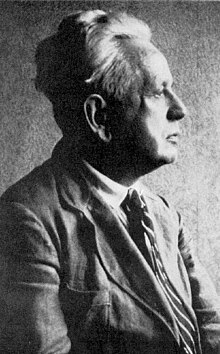
Back Ernst Cassirer Afrikaans إرنست كاسيرر Arabic ارنست كاسيرر ARZ Ernst Cassirer AST Ернст Касирер Bulgarian Ernst Cassirer Catalan Ernst Cassirer Czech Ernst Cassirer Danish Ernst Cassirer German Ernst Cassirer Esperanto
Ernst Alfred Cassirer | |
|---|---|
 Cassirer c. 1935 | |
| Born | Ernst Alfred Cassirer July 28, 1874 |
| Died | April 13, 1945 (aged 70) New York City, U.S. |
| Education | University of Marburg (PhD, 1899) University of Berlin (Dr. phil. habil., 1906) |
| Era | 20th-century philosophy |
| Region | Western philosophy |
| School | Neo-Kantianism (Marburg School) Phenomenology |
| Theses |
|
| Academic advisors | Hermann Cohen Paul Natorp |
Main interests | Epistemology, aesthetics |
Notable ideas | Philosophy of symbolic forms Animal symbolicum |
Ernst Alfred Cassirer (/kɑːˈsɪərər, kəˈ-/ kah-SEER-ər, kə-;[1] German: [ˈɛʁnst kaˈsiːʁɐ];[2][3] July 28, 1874 – April 13, 1945) was a German philosopher. Trained within the Neo-Kantian Marburg School, he initially followed his mentor Hermann Cohen in attempting to supply an idealistic philosophy of science.
After Cohen's death in 1918, Cassirer developed a theory of symbolism and used it to expand phenomenology of knowledge into a more general philosophy of culture. Cassirer was one of the leading 20th-century advocates of philosophical idealism. His most famous work is the Philosophy of Symbolic Forms (1923–1929).
Though his work received a mixed reception shortly after his death, more recent scholarship has remarked upon Cassirer's role as a strident defender of the moral idealism of the Enlightenment era and the cause of liberal democracy at a time when the rise of fascism had made such advocacy unfashionable. Within the international Jewish community, Cassirer's work has additionally been seen as part of a long tradition of thought on ethical philosophy.[4]
- ^ "Cassirer". Random House Webster's Unabridged Dictionary.
- ^ "Duden | Ernst | Rechtschreibung, Bedeutung, Definition". Duden (in German). Retrieved 20 October 2018.
Ẹrnst
- ^ "Duden | Cassirer | Rechtschreibung, Bedeutung, Definition". Duden (in German). Retrieved 20 October 2018.
Cassirer
- ^ Gordon, Peter E. (8 September 2009). "(Book 1) Ernst Cassirer: The Last Philosopher of Culture; (Book 2) The Symbolic Construction of Reality: The Legacy of Ernst Cassirer". Notre Dame Philosophical Reviews. Retrieved April 13, 2020.